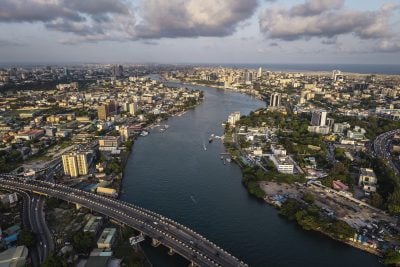The international economy appeared to recover from the shock of the Covid-19 pandemic and associated lockdown restrictions more quickly than had been expected. Highly effective intervention by governments, central banks and others resulted in 6.2% global growth in 2021. However, supply chain disruption and macroeconomic shortcomings quickly eroded widespread optimism, while the Russian invasion of Ukraine exacerbated the impact of rapidly rising inflation rates.
Global growth of 3.4% in 2022 was far lower than the IMF forecast of 4.9%, while African growth was similarly depressed at 3.9%. Central banks responded to decades-high inflation with a succession of interest rate increases, generating fears of stagflation. While the economic impact of the war in Ukraine was initially felt hardest in Europe, tighter global financial conditions disproportionately affected those economies most vulnerable to capital flow volatility and sudden stops – principally emerging markets.
The U.S. Federal Reserve’s (Fed) interest rate hikes saw the currencies of most developing countries depreciate against the U.S. dollar in 2022, further fuelling inflationary pressures, while African sovereign debt issuance collapsed from US$6bn in 2021 to US$20bn in 2022. The Western banking crisis has exacerbated global volatility, adding to sovereign debt and external debt servicing costs.
This perfect storm of overlapping crises is discussed in the recent Africa’s 2023 Growth Prospects: Securing growth resilience in a ‘polycrisis’ world report, which was produced by Dr Hippolyte Fofack, the chief economist and director of research and international cooperation at the African Export-Import Bank (Afreximbank). The report argues that persistent risks to long term growth, in the form of climate change and trade wars, have now been joined by geopolitical strains, opening the door to a ‘polycrisis’ world.
High levels of geopolitical risk depress economic activity, lower stock returns and drive capital away from emerging markets. At the same time, the Ukraine crisis has shifted global concerns away from pandemic-related health issues and towards political, security, macroeconomic and financial risks. The report notes that the Fed’s monthly index of geopolitical risk reached an all-time high in 2022— undermining economic growth and investor confidence.
The Sino-U.S. trade war has increased tariffs and hit trade volumes, so the World Trade Organisation has slashed its forecast for global trade growth for 2023 from 3.4% to 1%. “Trade restrictions increased dramatically over the past year, unlike in the era of the 2008 financial crisis, when there was a growing commitment to international co-operation and a concerted effort to boost cross-border trade and drive output expansion”, says Fofack.
The collapse of Silicon Valley Bank, which was the second-largest bank failure in U.S. history, has raised a fresh set of challenges for the financial system and global economy as a whole. The Afreximbank report argues that an increase in sovereign risk can affect balance sheets and lending appetite, stymieing private investment and growth in countries where banks are not well capitalised.
Current high rates of inflation have proved to be unexpectedly persistent and consistently above analyst forecasts in the U.S., UK and European Union. Fofack argues that monetary authorities must balance financial stability with price stability at a time when stubbornly high inflation is constraining their ability to respond.
The opening up of the Chinese economy from Covid lockdown measures could further fuel global inflation by releasing pent-up domestic demand and sharply accelerating growth in the world’s second largest economy. With most Asian economies experiencing less intense inflation, Asia will account for 46% of total global GDP growth in 2023, with China contributing more than 19%.
African growth forecasts
Against this difficult global backdrop, the Afreximbank report forecasts significant growth of 4.1% for Africa this year, roughly in line with other predictions. This growth will be shared across both the continent’s resource-rich and resource-poor economies, but with net-energy exporting countries benefitting from high oil prices. For instance, following four years of recession, Angolan growth of 2.9% in 2022 is expected to rise to 3.5% this year.
Nigeria is expected to generate reasonable growth of 3.2% as a result of improved security and oil production, plus a rebound in agricultural output following last year’s devastating floods. On a more negative note, power shortages and other infrastructural shortcomings will see South African growth slow from 2.1% in 2022 to less than 0.5% for 2023, while the South African Reserve Bank will continue extremely aggressive monetary tightening to counter historic levels of inflation.
East Africa is expected to be the fastest growing region at 5%, with Rwanda (6.7%) and Uganda (5.9%) leading the way. Southern Africa is the only African region where aggregate GDP growth is expected to decelerate this year, at 2.1%, down from 2.5% in 2022, largely because of the stagnant South African economy. Taking the continent as a whole, the fact that more than 80% of African countries remain highly commodity dependent constrains their trade prospects given that global trade is largely driven by manufactured goods with increasing technological content
Improving prospects
Afreximbank expects the operating environment to be more favourable and growth-friendly in 2023. This is partly because of the anticipated depreciation of the U.S. dollar as the downshift in U.S. market yields takes hold, while the Fed is expected to begin cutting rates later this year. At the same time, Chinese GDP is forecast to expand by at least 5.5% in 2023, up from 3% last year. According to IMF research, a one percentage point increase in China’s domestic investment growth is associated with an average 0.6 percentage point increase in Sub-Saharan countries’ export growth. Continued growth in overseas remittances and the geopolitical realignment of global supply chains will further boost growth prospects.
African economies are not passive in this situation and there is much that can be done to boost growth levels now and over the coming years as inflation eases, with average inflation in Africa set to fall from 14.5% in 2022 to 12.4% this year and 8.7% in 2024. The report highlights the factors that could accelerate growth on the continent, including: rising infrastructural investment; ongoing structural transformation and the diversification of sources of growth; improving the macroeconomic environment; and digitalisation.
Afreximbank is particularly optimistic that the digital revolution will raise productivity and competitiveness to drive investment, with the digital economy contributing almost US$180bn to the continent’s growth by the middle of this decade. Moreover, the African Continental Free Trade Association (AfCFTA) will act as a pull factor that increases the region’s competitiveness as global supply chains are realigned.
Outlook
The report explains how African growth prospects are tied to global factors such as key central banks tackling inflation; geopolitical risks and attendant supply chain disruption; trade wars and fragmentation risks; conflict and growing insecurity; and climate change. It calls for international cooperation to be strengthened to create shared solutions to global crises, including on bringing the Sino-U.S. trade war to an end.
Successful implementation of the AfCFTA will have a big impact on long term African growth prospects, but the report concedes that reining in inflation must be the priority in the immediate term. “Striking the correct balance between curbing inflationary pressures and buttressing growth is crucial” is particularly important for African countries, which have been the most affected by aggressive monetary tightening on the global stage, it says.
Want to continue reading? Subscribe today.
You've read all your free articles for this month! Subscribe now to enjoy full access to our content.
Digital Monthly
£8.00 / month
Receive full unlimited access to our articles, opinions, podcasts and more.
Digital Yearly
£70.00 / year
Our best value offer - save £26 and gain access to all of our digital content for an entire year!

 Sign in with Google
Sign in with Google 



